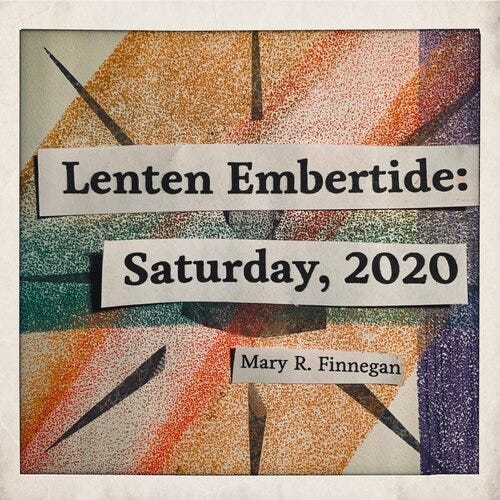“If we have no peace, it is because we have forgotten that we belong to each other.”
- Mother Teresa
I
Wild in the woods, bamboo flowers a warning.
Here, the windy day turns to fair night.
The dog and I walk at civil twilight. The hump
backed moon lights up the evening sky,
its missing sliver the darkness that cannot
completely hide. The dog slows, whimpers.
A hawk swoops low, its wings slashing
a dark furl across the sky. We hear a rustle,
a squeal. A swallow, unnested, small and alone.
The dog groans.
II
We will all be dashed to pieces soon, wretched
in our gloom, our powers prey to lesser gods.
Still, I say,
do not let those gods, that gloom, that frenzied mob
bewitch you. Today, we need only till our given land,
raise houses, sheep, wheat, our children.
We need only shed our lies like an old cloak, lift
our poor neighbor into our arms and feed him
with our own spoon. This time,
its crooked paths, its smited air, its ashed remains
will bring us to that other shore where the present
is not pressed between two stones and the river flows
with ever-flowing waters, the path is righted,
time’s ashes swept away, the air unsmited.
III
Do not let grief beguile you.
In suffering’s caul, all is transfigured.
There is weeping, yes, and sorrow, but the world
remains lit by the uncreated light.
So look up and see. See that cluster of new and ancient stars
jeweled across the clavicle of midnight.
IV
At dawn’s twilight, I walk. Fair night turns to tragic day.
Still I say,
put your weapons down, though your anger
be righteous. Do not let it possess you
for the day is upon us when the sun will rise at first light.
Lift your neighbor up, up and bless him. Bless him.
Even now.
The day is upon us when the Son will rise at first light.
That’s the last of the Lenten Embertide poems, again published in Lydwine. Please do check out the journal.
The Gospel reading for Saturday of Lenten Embertide is from Matthew 17:1-9 about the Transfiguration of Christ on the “high mountain.” Peter, James, and John were with Him, witnesses as “he was transfigured before them. And his face did shine as the sun: and his garments became white as snow. And behold there appeared to them Moses and Elias talking with him.”
Because Ember Days aren’t really practiced anymore, the Gospel reading for Saturday, the first week of Lent, is from Matthew, chapter 5:43-48:
you have heard that it hath been said, Thou shalt love thy neighbor, and hate thy enemy. But I say to you, Love your enemies: do good to them that hate you: and pray for them that persecute and calumniate you: That you may be the children of your father who is in heaven, who maketh his sun to rise upon the good, and bad, and raineth upon the just and the unjust. For if you love them that love you, what reward shall you have? do not even the publicans do this? And if you salute your brethren only, what do you more? do not also the heathens this? Be you therefore perfect, as also your heavenly Father is perfect.
This, of course, is one of the most radical, if not the most radical command of the Lord. It might be more radical than, Take and eat, for this is my body. It goes against everything in human nature, the good and the bad. Our pride, our self-righteousness, our desire for vengeance all push us towards anger, revenge, grudges, wars.
But this command also goes against our instincts for survival and for justice. If someone does us harm, our hearts demand justice, which, of course, is not a bad thing. A society needs to be just in order for all its people to have the chance to prosper. And to forgive someone, to love someone who has done us harm means that we have to place a certain amount of trust in them, which goes against every survival instinct.
When Jesus gave this command, it must have been utterly shocking to this listeners. Society then was tribal, insular, protective. It is easy for us to think we’ve moved beyond those backwards ways of thinking, but we haven’t. Look at cancel culture. Listen to the way we talk about those with whom we disagree about politics. Surf the internet. It’ll take you about 30 seconds to find a whole world of hate on there, from all sides, not just the “other” side.
And where does all that hate gets us? What good does it do? The demand for justice and the demand to love those who do us harm are not mutually exclusive. It’s just a lot easier to demand justice. And it feels so good at the time, whereas loving your enemy, not so much. But, I think, if we want peace and justice in our society then we need to forgive, to love, to follow the commands of the Lord.




This gospel is so very poignant in today’s political environment.
We must all love our enemies in order to have peace.
Thank you Mary for your poetry and your writing. I enjoy it so much❤️